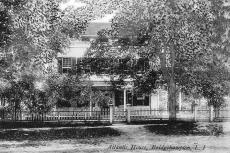Nine months after the East Hampton Town Board agreed to create an administrative adjudication bureau to expedite processing minor violations of the town code, a plan is set to proceed.
In February, two assistant town attorneys and the chief harbormaster presented their recommendations for a procedure allowing those committing minor violations to pay fines by mail or online, rather than having to appear in town justice court. With the exception of parking violations, there is at present no way to pay fines for offenses such as open-container violations, driving on the beach without a permit, littering, or illegal beach fires.
On Tuesday, Supervisor Peter Van Scoyoc told his colleagues that Assemblyman Fred W. Thiele had successfully shepherded an amendment to New York State’s general municipal law through the State Legislature and that Gov. Kathy Hochul subsequently signed it into law. These were prerequisites to the town amending its code to establish the bureau, laying out its operating procedures, and enumerating the violations to be adjudicated before it.
East Hampton Town Police Chief Michael Sarlo, Ed Michels, the town’s chief harbormaster, and Kevin Cooper, the director of ordinance enforcement, all spoke to the board during its virtual work session. “People don’t want to come back to East Hampton on Monday and pay the fine,” Mr. Michels said of weekend visitors who run afoul of the law. “They’re happy to pay the fine, they just don’t want to come back.”
Mr. Michels had told the board in February that an administrative adjudication bureau would keep officers in the field while keeping the justice court calendar from congestion. Instead of eight officers on patrol and four doing paperwork, he said in February, “they’ll have the whole time out there, which of course will give us more enforcement.” On Tuesday, Mr. Sarlo referred to the state’s criminal justice reform law, which took effect last year and has added to police officers’ workload in the form of paperwork, taking them out of the field.
Mr. Michels reiterated on Tuesday the importance of the best use of manpower, allowing quality of life issues to be addressed while minimizing officers’ time in court or completing paperwork. With the town’s population growth since the Covid-19 pandemic and a shortage of staff “in every department,” Mr. Michels said, “we have to spread people out.” An administrative adjudication bureau “will definitely double if not triple your manpower and enforcement activity.”
That, Mr. Van Scoyoc said, would result in the issuance of more summonses and thus revenue through fines assessed.
An administrative adjudication bureau would result in “an overall better presence for all the public safety departments in the town,” Mr. Cooper said.
NancyLynn Thiele, an assistant town attorney, said that the bureau could also handle matters related to the town’s rental registry, increasing both enforcement and collection of fines. “You’ll see it is much better suited for some of those situations that justice court has difficulty bringing justice for,” she said.
Establishment of the bureau would require a public hearing and adoption of a resolution amending the town code. “Ideally, we’d want to be up and running early in the new year,” Mr. Van Scoyoc said.
Ms. Thiele told the board that, upon establishing the bureau, “the first thing the town would need to do is hire a director as chief administrative law judge of the bureau.” That person should be an attorney who is knowledgeable about administrative law and procedure, she said. Once in place, they would promulgate rules and regulations, and could appoint between four and seven administrative law judges “to actually serve as the judges on these civil matters.” The bureau would likely need clerical assistance as well, she said.
While the director is establishing policies and putting staff in place, “we can determine which sections of our town code we want to be able to refer to this administrative bureau,” Ms. Thiele said.



